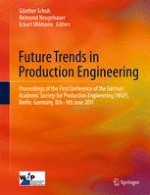2013 | OriginalPaper | Chapter
36. Model-Based Planning of Resource Efficient Process Chains Using System Entity Structures
Authors : R. Larek, E. Brinksmeier, T. Pawletta, O. Hagendorf
Published in: Future Trends in Production Engineering
Publisher: Springer Berlin Heidelberg
Activate our intelligent search to find suitable subject content or patents.
Select sections of text to find matching patents with Artificial Intelligence. powered by
Select sections of text to find additional relevant content using AI-assisted search. powered by
